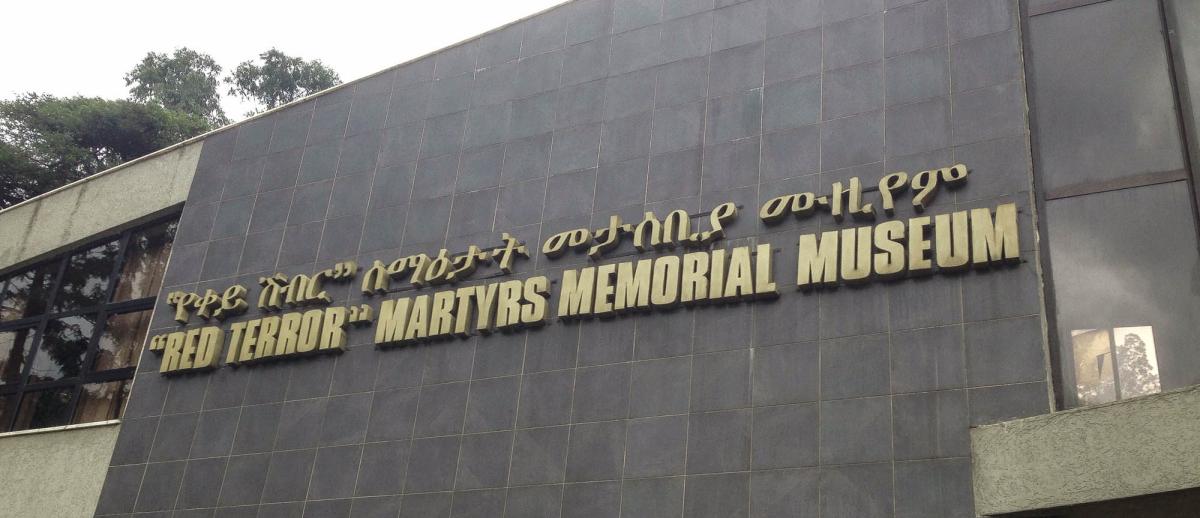Reckoning with Africa and the Desire for a Global Mnemoscape
archive


'Red Terror' Martyrs Memorial Museum, Addis Ababa, Ethiopia
Reckoning with Africa and the Desire for a Global Mnemoscape
What would it mean to think through the charge of registering the phrase ‘mnemonic solidarity’ as a call, and how one might answer such a beckoning responsibly from the vantage point of a non-geographically demarcated Africa? In what follows, we outline the stakes of reckoning with Africa in the formulation and deployment of what has been called a global mnemoscape, and what it might mean to respond to mnemonic solidarity as a call with these stakes in mind. We explore this position through an analysis of two mnemonically disobedient devices: Ethiopia’s Red Terror as genocide, and apartheid South Africa’s states of emergency.
Registering mnemonic solidarity as a call—indeed, a summons—assumes the potential and capacity to hear and listen of the persons whose subjecthood is textured by the discursive punctures of the global mnemoscape. These punctures should be thought of as ruptures which perforate the desire for a discourse of memory that would encompass the world, and where a different kind of solidarity might be comprehended. Thus, the aural terms are invoked with specific intonation: hearing in the sense of activation, of sensing and of making perceptible, and listening as activism—as engagement, attentiveness, and action.
Thus, if understood in the aforementioned terms, a call for mnemonic solidarity should be read as marking both a desire for and a movement towards dismantling the territorializing of global mnemonic discourses on colonialism, war, and genocide. The desire inherent in this call is to think through the entanglement of memory without dissolving the specificity of these forms of violence as politics, as unfinished histories, and as divergent memories, in all their various iterations.
To abide by this beckoning is to work toward the realization of a global mnemoscape that would facilitate an entanglement of memory, implying not the universalization but rather a democratization of mnemonic discourses. Such facilitation is instructive for how we might attend to certain disciplinary and methodological inheritances. Specifically, it is useful insofar as it counteracts the production of an attitude that assigns value in relation to a hierarchical ordering of human suffering.
Working toward that which the call whispers as its object of desire, we argue, requires a listening to Africa as a concept, beyond its geographic designation as place. This gesture refuses the inclination to treat discourses on colonialism, war, and genocide as discrete. The differences between genocide, war, and colonialism are textured perhaps most starkly by their intent: the first being to destroy, the second to resolve, and the third to civilize. What these objectives also share, perhaps most strikingly, is the desire for betterment in relation to which their intent becomes method.
Such a listening is implicit in the term solidarity, and the democratization of memory discourses requires a thinking through and from Africa that recognizes it as a mnemoscape entangled in solidarity with others. Africa has been lodged as one of the spatial and conceptual others of the West through the discourses of the modern episteme and the effects thereof, not least of which can be located in area studies and anthropology. Consider, for example, the contemporary trajectory of migrancy that posits the West (and those locales who are marked as its proxies) as always a destination: that to which is aspired spatially but also (as a consequence of the teachings of modernity) conceptually. The Rest (most of Africa, Asia, South America, and so on) are marked conversely as points of departure: that from which, according to the same epistemic logic, that same trajectory is to spatially and conceptually progress. But the deconstruction of this perception of Africa, an example of the democratization to which we referred earlier, however, requires an understanding of Africa as a concept and indeed articulating modes of thinking about the world that are non-Eurocentric. It furthermore requires a grappling with Africa’s unsettling of globally accepted definitions of genocide and colonialism—and in markedly different ways than elsewhere in the world.
...a call for mnemonic solidarity should be read as marking both a desire for and a movement towards dismantling the territorializing of global mnemonic discourses on colonialism, war, and genocide.
Ethiopia is one space through which to do precisely this. Having ratified the Convention on the Prevention and Punishment of the Crime of Genocide (1948) in the year of its enactment, the country later also translated the definition of genocide into its Penal Code (1957), expanding thereon to provide protection for not only racial, ethnic, national, and religious groups, but also political groups. It is as a result of this elaboration that after the dismantlement of the Derg regime in 1991, the Special Prosecutor for the local courts was able to charge persons responsible for the Ethiopian Red Terror (officially 1977-1978) with the crime of genocide. By contrast, in the chambers of the International Criminal Court (ICC), perpetrators of the Red Terror could only be charged with War Crimes, as a recent case has shown.
Indeed, it is this highlighting of the tension between the definitions of genocide and war enshrined in international law that also invites specific attention to how it is that colonial war, conquest, and matters of mnemonic complicity unfold in relation to Africa. For example, the military industrial complex of the South African apartheid state that produced the notion of ‘total war’ in relation to the political atmosphere of the Cold War is particularly decisive for how we respond to the call for mnemonic solidarity. It was in the guise of total war that apartheid as bureaucratic structure would stage its last stand as a series of states of emergency, formalized periods of militarization, and the suspension of human rights in favor of humanitarian principles. More telling, however, is that the notion of total war would at once camouflage what was essentially South African colonial imperial war in neighboring Angola and Namibia, and produce a mnemonic structure intertwining conscription, the nation state, and citizenship.

Military mobilization during 1986 state of emergency in South Africa.
What the examples of Ethiopia and South Africa reveal is that attention must be directed towards the notion of the apparatus: juridical, imperial, mnemonic, disciplinary, technological, or otherwise. Thinking in terms of apparatus could be constitutive not only of how we might approach mnemonic solidarity as a call, but also how it is we might reckon with Africa in the moment of such a hailing. Indeed, what was made apparent in our examples was the question of technique: a working on the subject that cannot be neatly subsumed into what has been called the global mnemoscape. For example, Ethiopia proves critical if we are to think the mnemonic through its technicality, the Ethiopian Red Terror as an example of genocide sits precisely within that work of memory called forgetting. It is that expression of genocide, within a space never colonized, that genocide studies largely refuses to remember. Similarly, it is through this idea of technique that we might revisit the notion of the mnemoscape as a spatial metaphor and a topographical field of view. Instead, reckoning with Africa, an attention to technique, and an awareness of apparatus invites attention to the work of mediation and its work of entanglement. We might therefore ask with Africa in mind: what do the structuring techniques of the mnemonic turn look like?
If we are to consider apartheid not only as that which is specific to South Africa, but also as a particular formulation bringing together biopolitics, sovereignty, and technology as a resolution for a dying colonialism, it is crucial that we pay attention to how it is that mnemonic solidarity might offer us a language of decolonization that deterritorializes rather than merely repeats the scripts of deadness that genocide, colonialism, and war—particularly in postcolonial Africa—have produced.
Furthermore, it requires of the discourse of genocide, colonialism, and war a reckoning with Africa that is not schizogenic in its reading of the concept of Africa—a reading that produces Africa as mnemonic marker—but is instead reflective of its shimmer. Put differently, mnemonic solidarity requires a dialogue with Africa, recognizing it not as “then and there” from the “here and now,” but rather as a contemporary and an interlocutor. This is to hear Africa’s re-call, and to listen to it by allowing for dialogue that is pluralistic and diffuse.
Althusser, L. “Ideology and ideological state apparatuses.” In L. Althusser (Ed.), Lenin and philosophy and other essays. New York: Monthly Review Press, 1971.
Barthes, R and Havas, R. "Listening." The Responsibility of Forms. New York: Hill and Wang, 1985.
Cock, J. and Nathan, L. (eds). War and Society: The Militarisation of South Africa. David Philip, Cape Town, 1989.
“Ethiopia: 'Red Terror' war crimes trial begins at The Hague.” BBC, October 30, 2017. Available at: https://www.bbc.com/news/world-africa-41802232
Fabian, Johannes. Time and the Other: How Anthropology Makes Its Object. New York: Columbia University Press, 1983.
Hussain, N. The Jurisprudence of Emergency: Colonialism and the Rule of Law. Ann Arbor: University of Michigan Press, 2003.
Kiernan, B. Blood And Soil: A World History Of Genocide And Extermination From Sparta To Darfur. New Haven, Conn. : Yale University Press, 2009.
Penal code of Ethiopia 1957. Available at: https://www.refworld.org/pdfid/49216a0a2.pdf
Sitze, A., “The Imperial Critique of Imperial War,” in Filosofia Politica 25(2): August 2011.
Tiba, F. “The Mengistu Genocide Trial in Ethiopia,” in Journal of International Criminal Justice, May 2007.
UN General Assembly, Prevention and punishment of the crime of genocide, 9 December 1948, A/RES/260. Available at: https://www.refworld.org/docid/3b00f0873.html
UN General Assembly, Rome Statute of the International Criminal Court (last amended 2010), 17 July 1998, ISBN No. 92-9227-227-6. Available at: https://www.refworld.org/docid/3ae6b3a84.html




